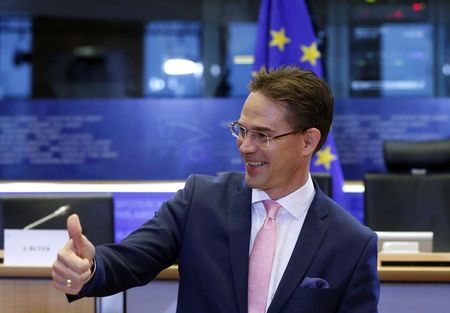By Jan Strupczewski
WASHINGTON (Reuters) - Germany, France and Italy must focus on public investment to boost economic growth, the European Union's incoming top official responsible for growth and jobs said on Thursday.
Jyrki Katainen, who will take over as the European Commission's vice president for jobs, growth, investment and competitiveness on Nov. 1, told Reuters many countries have cut investment too much as part of efforts to consolidate budgets
"Countries like Germany, running current account surpluses, can afford to invest more, not only because it would stimulate the economy of the European Union, but because they need to take care of their future economic growth," Katainen said in an interview on the sidelines of the IMF and World Bank fall meetings in Washington.
German investment has been falling steadily over the past two decades, from around 21 percent of its GDP in the late 1990s to just above 17 percent now, according to the Centre for European Reform think thank.
Yet Berlin, pursuing a goal of a balanced budget, is reluctant to increase public investment.
"A country that is strong at the moment does not necessarily have to be strong in the future, so you need to take care of the growth, strengthen the industrial base," Katainen said.
"Our message is that the surplus countries should invest in their future," he said, pointing to research and development, and infrastructure as the main areas for investment.
Katainen said France and Italy also needed to spend more on public investment, but, unlike Germany, could not simply increase borrowing for that purpose because their deficits and debts already were too high.
Instead, they should spend the money available in their budgets in a different way: "Both countries should prioritise investment," he said.
PRAISE FOR ITALY, NOT FOR FRANCE
Katainen praised Italy for pushing on with labour market reforms, which he said would strengthen the country's competitiveness in the medium- to long-term and raise confidence.
"It is a very good thing they are doing," he said.
Paris, on the other hand, should try harder.
"France should do more. Structural reforms are sometimes more difficult to do than budget consolidation," he said.
Cutting taxes and recouping the lost budget revenue by raising environmental and indirect taxes is one example of a structural reform that could quickly help boost economic growth in all of the core euro zone countries, Katainen said.
That was also the conclusion of EU finance ministers at their last meeting in Milan in September when they noted that 11 European countries, including Germany, could cut taxes on work.
Katainen noted that by January, the European Commission, the European Union's executive arm, would present a separate investment plan that is to produce 300 billion euros in investment over three years.
While the European Union does not have that kind of money ready at hand, it plans to use its much smaller available funds in the European Investment Bank and the EU budget as seed money that would attract much larger sums of private investment.
"It is not 300 billion on the table, it is investments worth 300 billion. That's why the private-public partnership is very important," Katainen said.

"Our aim is to crowd in private money for big infrastructure projects in the energy sector, transport and broadband. The private sector cannot take all the risks," he said.
(Reporting by Jan Strupczewski; Editing by Paul Simao)
